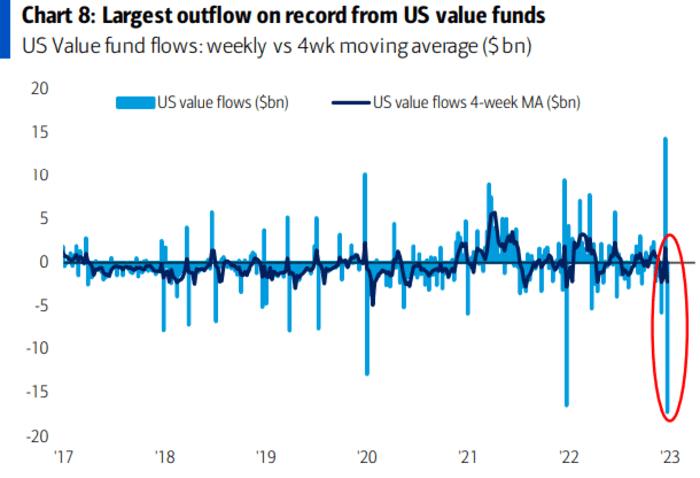Investors withdrew billions of dollars from equity funds at a record pace in the days after the Federal Reserve, the Bank of England and European Central bank raised interest rates in mid-December and reiterated their commitment to lowering inflation, fueling fears of an economic downturn.
Stock funds recorded the biggest ever weekly outflows of $ 41.9 billion in the week to December 21, with $ 27.8 billion of which being withdrawn from exchanged traded funds and $ 14.1 billion from mutual funds, according to analysts at BofA Global Research, citing EPFR Global data in a weekly note.
BofA analysts led by Michael Hartnett, chief investment strategist, attributed the sell-off to “tax loss harvesting,” a strategy that includes deliberately selling an investment at a loss in order to use that loss to offset taxes owed on investment gains.
Meanwhile, passive equity funds saw total outflows of $ 27.8 billion in the week to Wednesday, while U.S. value funds recorded a weekly outflow of $ 17.2 billion (see chart below). Both were the biggest sell-off on record.

SOURCE: BOFA GLOBAL INVESTMENT STRATEGY, BLOOMBERG
The BofA’s Bull & Bear Indicator dipped to 3.0 from 3.1 last week, driven by the first bond fund outflows in three weeks. Bond funds recorded net outflows of $ 10 billion.
For the year however, BofA said equity funds saw total inflows of $ 166.5 billion. In contrast, bond funds recorded outflows of $ 257.1 billion.
U.S. stock indexes have fallen since Wednesday last week when the Federal Reserve raised its benchmark interest rate at a slower pace to a range of 4.25% to 4.50%, but projected a higher-than-expected terminal rate in 2023.
Not long after the decision, central banks in Europe followed the Federal Reserve in slowing the pace of interest rate increases. Both the European Central Bank and Bank of England hiked their key lending rates by 50 basis points and policy makers at the ECB emphasized that market participants should prepare for a series of rate increases to come.
See: Here’s how U.S. investors can position themselves for the sea change out of Japan, according to Bank of America and Citi
Earlier this week also, the Bank of Japan (BoJ) stunned markets with an unexpected change to its controversial yield curve control policy. The BoJ, an outlier among major central banks for having maintained rates at the zero lower bound, doubled the cap on the country’s 10-year bond yield TMBMKJP-10Y, 0.383% from 0.25% to 0.5%, whacking equities in the region and triggering big swings in the U.S. stock market.
Strategists at BofA said they are bullish on commodities instead of credit, and preferred “rest of the world” stocks over U.S. stocks, while favoring small-cap over large-cap.
Sector wise, they preferred value over growth stocks, and industrials and banks over technology and private equity.
See: A stock market indicator with one of the best track records has rare good news for investors
U.S. stocks ended the week mostly lower on Friday. The Dow Jones Industrial Average DJIA, +0.53% booked a weekly gain of 0.9%, while the Nasdaq Composite COMP, +0.21% shed nearly 2% and the S&P 500 SPX, +0.59% was down 0.2% for the week, according to Dow Jones Market Data.
